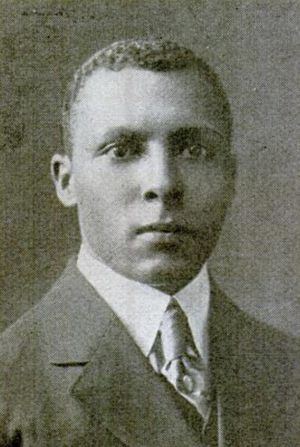Max Yergan facts for kids
Quick facts for kids
Max Yergan
|
|
|---|---|
 |
|
| Born | July 19, 1892 Raleigh, North Carolina
|
| Died | April 11, 1975 (aged 82) Mount Kisco, New York
|
| Nationality | American |
| Occupation | activist, missionary |
Max Yergan (born July 19, 1892 – died April 11, 1975) was an important African-American activist. He had a very interesting life, changing his views over time. He started as a missionary for the YMCA, helping people. Later, he became involved with Communism, a political idea. But then, he strongly opposed Communism. He even praised some parts of the government in apartheid-era South Africa.
Max Yergan was a mentor to Govan Mbeki, who became a leader in the African National Congress. Yergan also served as the second president of the National Negro Congress. This group was formed in 1935 to fight against unfair treatment based on race. It also worked to connect with Black organizations worldwide. With Paul Robeson, he helped start the Council on African Affairs in 1937.
Contents
Early Life and Education
Max Yergan was born on July 19, 1892. His birthplace was Raleigh, North Carolina. He grew up in his grandfather's house. His grandfather, Fred Yeargan, was a big inspiration. Fred was a board member at Shaw University and a church member. He was also very interested in his African heritage.
Max went to St. Ambrose Episcopal Parish School as a child. Then, he attended Shaw University. At Shaw, he learned about the YMCA. In 1916, he joined a YMCA missionary trip to India. This trip had a big impact on his life.
Work in Africa and Beyond
Yergan went to South Africa in 1920. He worked there as a missionary for the YMCA. He was the first African-American to do YMCA work in that country. He wanted to improve social work in South Africa. This led to the creation of the Jan H. Hofmeyr School of Social Work.
His time in South Africa changed his views. He wanted the YMCA to take a stronger stand on social issues. But the YMCA did not agree with his ideas. So, he left the organization in 1936. Two years before that, in 1934, he visited the Soviet Union. After this trip, he reportedly became a Marxist.
Teaching and Political Changes
When Yergan returned to the United States, he made history. He became the first African-American professor at City College of New York. In the fall of 1937, he taught a course called "Negro History and Culture." This was the first time such a course was offered there.
Later, during the Cold War, Yergan's views changed again. He became unhappy with Communism. He then became a strong opponent of it. In 1948, he was removed as director of the Council on African Affairs. This happened after disagreements with other members. This event led him to support more conservative ideas.
In 1952, Yergan visited South Africa again. He spoke against Communism. He claimed that the main anti-apartheid group, the African National Congress, was controlled by Communists. In 1955, he visited South Africa once more. This time, he praised the apartheid system. He said that Black South Africans were not suffering from it. That same year, he also visited Portuguese Angola. He praised the way Portugal ruled the colony.
Later Activism
In 1961, Yergan became president of a group called the American Committee for Aid to Katanga Freedom Fighters (ACAKFF). This group wanted the United States to recognize Katanga. Katanga was a region trying to break away from Congo. Yergan said the Congolese government was controlled by Communists. He praised the Katangan people for wanting to defend themselves. However, many of the soldiers fighting for Katanga were not from there. They were white soldiers from Europe and other parts of Africa. These soldiers were known for their harsh actions.
In 1962, Yergan wrote a letter to the Secretary of State, Dean Rusk. He was upset that the U.S. had not allowed Moïse Tshombe, a Katangan leader, to visit. In 1964, Yergan praised parts of South Africa's "separate development" plan. In 1966, he became co-chairman of the American-African Affairs Association. This group wanted the U.S. to recognize the white minority government in Rhodesia. Yergan visited Rhodesia in 1966. He reported that he saw no evidence of racism there.
Death
Max Yergan passed away on April 11, 1975. He died in Mount Kisco, New York. He was almost 83 years old. Because his beliefs changed so much during his life, he had only a few close friends when he died.
Honors and Awards
Max Yergan was a member of the Alpha Phi Alpha fraternity at Shaw University.
In 1933, he received the Spingarn Medal. This award is given by the NAACP.
His personal papers are kept at Howard University.
 | Aurelia Browder |
 | Nannie Helen Burroughs |
 | Michelle Alexander |

